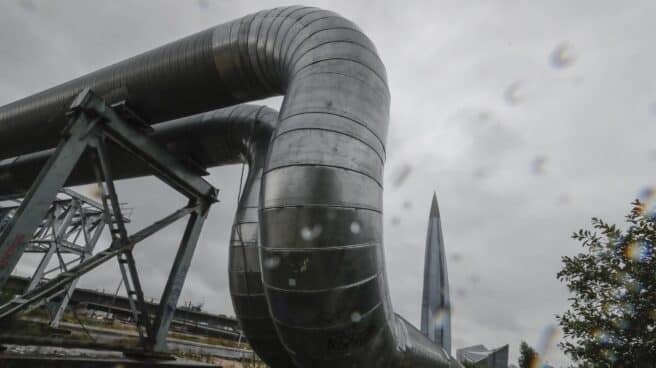

Gas pipeline in St. Petersburg against the backdrop of the headquarters of Gazprom.
Uncertainty and volatility. These are the two main conclusions of Naturgy President Francisco Reines at a press conference after summing up the results for 2022, in which he made historic profits through commercial activities and gas sales.
The price of gas has become one of the main problems for all world economies after the conflict in Ukraine. Russia, which was one of the main exporters to Europe, decided to turn off the tap, putting pressure on prices as Germany, Holland and the rest of the Central European countries were energetically fueled by the Kremlin.
Although the price of gas has fallen in recent months, this is due to the fact that the winter turned out to be milder than expected. The short-term outlook is actually optimistic. Future gas prices for all of 2023 are down 23% in the first month of the year and 17% for 2024, which is down 17%. A megawatt of gas costs 55.23 euros for the rest of the year, and 60.21 euros for the next year. “Sustained low demand and high supply of liquefied natural gas (LNG) are putting pressure on gas prices as European heating season continues (November 1 to April 30) and stocks are discovered, despite a reduction in supplies from Russia, at 72% of its capacity.
But don’t let yourself get carried away by the euphoria. Starting from May, European countries will start refilling gas tanks so that there will be enough stocks for next winter. This would mean that the price per megawatt hour would fall again unless Europe reached a joint purchase agreement, which at the moment does not appear to be happening.
In November, the European Commission unveiled a new energy price emergency package that included a centralized gas purchase platform to boost the European Union’s bargaining power. But everything remains in the document and so far there is nothing concrete for this.
Reines also spoke of China’s awakening as a possible variable for rising gas prices. “China has experienced an unusually long lockdown and its operations have suffered. It started to recover a few weeks ago, and everything indicates that natural gas will again be in demand on a large scale,” he said.
We cannot forget that China is one of the great economic and industrial powers and that it is phasing out coal and needs alternative raw materials to move forward. And that is natural gas. The Asian giant is the second most important import market after the entire European Union with 13% of the global weight.
According to the latest official data, China It has grown from 4,480 TWh in the early 2000s to 14,325 TWh per hour in 2021, tripling consumption in just 20 years. In addition, energy sector sources note that Asian buyers are “good buyers” and that “they usually don’t resist paying the asking price, unlike Europe and the rest of the West.”
Finally, Francisco Reines noted that Russia “does not exist and is not expected”, so it will be difficult to have one of the largest suppliers in Europe this year, as it happened in 2022.
Algeria, background
Another issue to be discussed, how could it be otherwise, is the issue of Algerian gas. Naturgy will have to renegotiate its prices with Sonatrach for this year and next, but they hope an agreement can be reached at a “reasonable” price.
“We were able to reach reasonable agreements with Sonatrach last year and expect the same in 2023,” he said of the agreement reached last October between the two parties on the price of natural gas for 2022.
Reines stated that naturgia From this Algerian company, it buys approximately 5 billion cubic meters of gas (5 billion cubic meters), that is, “half of all gas entering Spain through the gas pipeline to Spain through Medgaz.”
Spain and Algeria broke off diplomatic relations after Pedro Sanchez’s government changed its vision of the Sahara. This modification forced Algeria to tighten the rope and jeopardize trade relations between both sides.
Reines, in this sense, emphasized the “excellent” relationship that exists with this Algerian state-owned company, since it is partly a shareholder in Naturgy; a client, a partner of the Medgaz gas pipeline, which links Algeria with Spain through the Andalusian coast, and at the same time is a competitive company, since it conducts wholesale marketing activities in Spain.
Source: El Independiente